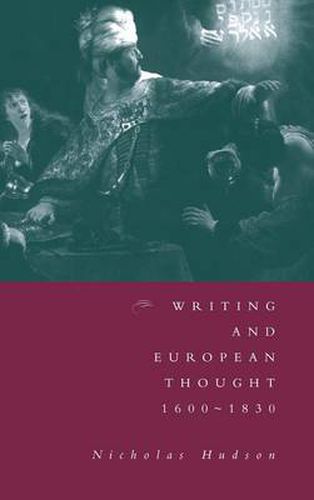Readings Newsletter
Become a Readings Member to make your shopping experience even easier.
Sign in or sign up for free!
You’re not far away from qualifying for FREE standard shipping within Australia
You’ve qualified for FREE standard shipping within Australia
The cart is loading…






Writing and European Thought 1600-1830 argues for the central importance of writing to conceptions of language, technological progress, and Western civilisation during the early modern era. Attitudes to the written language changed radically between the late Renaissance and Romanticism, and Nicholas Hudson traces the development of thought about language during this period, challenging some central assumptions of modern historical scholarship. He asserts that European thinkers have not been uniformly ‘logocentric’, and he questions the assumption that the rise of print and literacy produced a more visually oriented culture. Through detailed readings of major writers, Hudson shows how writing became the emblem of the superiority of European culture, and how, with the expansion of print culture, European intellectuals became more aware of the virtues of ‘orality’ and the deficiencies of literate society.
$9.00 standard shipping within Australia
FREE standard shipping within Australia for orders over $100.00
Express & International shipping calculated at checkout
Writing and European Thought 1600-1830 argues for the central importance of writing to conceptions of language, technological progress, and Western civilisation during the early modern era. Attitudes to the written language changed radically between the late Renaissance and Romanticism, and Nicholas Hudson traces the development of thought about language during this period, challenging some central assumptions of modern historical scholarship. He asserts that European thinkers have not been uniformly ‘logocentric’, and he questions the assumption that the rise of print and literacy produced a more visually oriented culture. Through detailed readings of major writers, Hudson shows how writing became the emblem of the superiority of European culture, and how, with the expansion of print culture, European intellectuals became more aware of the virtues of ‘orality’ and the deficiencies of literate society.